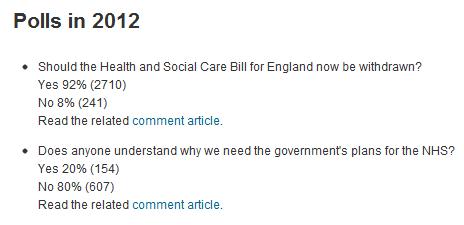Guardian and Press Association's reporting of BMJ poll under scrutiny
Anthony Wells' UK Polling Report blog this morning spotted a contentious 'poll' cited in the Guardian's coverage of controversy surrounding the Health and Social Care Bill.
In what the blog termed an example of 'voodoo' polling, the British Medical Journal ran an online survey asking its visitors whether the under-fire bill should be 'withdrawn'.
The results of the survey provided the fuel for the Guardian's comment:

The Guardian: "More than 90% of those who voted in a British Medical Journal poll believed the planned health reforms should be scrapped. Of 2,947 votes cast on bmj.com over the last week, 2,706 said the reforms should be dropped while 241 said they should stay."
As UK Polling Report commented, to judge the results of the poll as representative of BMJ readers would be a mistake, since it was conducted with open access to all who visited the website, meaning the poll lacked the standards subject to most other polls that are reported in the press.
The report raises an interesting issue however as to whether the Guardian's reporting was problematic. While the newspaper made clear the source of the polling data, Wells' blog is concerned that the inclusion of such data in a report might give the findings undue weight, which in the current policy climate could be damaging to the public's understanding of the issue.
Whether or not Guardian readers understood the caveats that need to be applied to these poll findings, it is worth noting that they weren't included in the Press Association report on the same issue. This merely stated:
Press Association: "More than 90% of readers of the British Medical Journal (BMJ) believe the Government's health reforms should be scrapped, according to a poll."
Given what we know about the source of the poll, for the Press Association to extrapolate the data and attribute it to "readers of the British Medical Journal" paints a highly misleading picture.
Full Fact highlighted the problems with this and inaccuracy in general in its Evidence to the Leveson Inquiry earlier today.